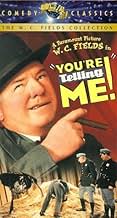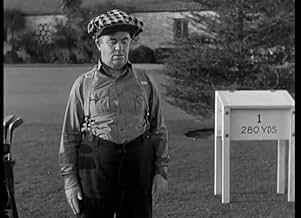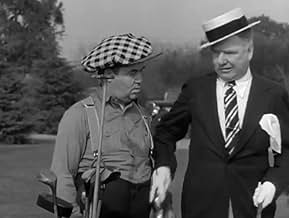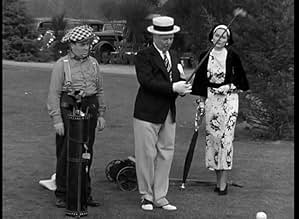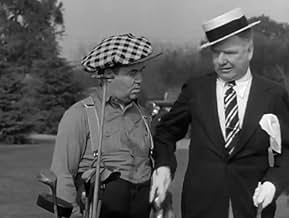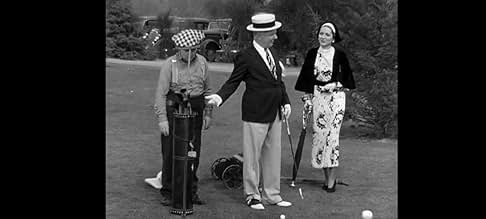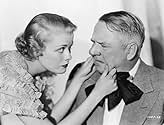NOTE IMDb
7,4/10
1,3 k
MA NOTE
Ajouter une intrigue dans votre langueA hard-drinking, socially-awkward inventor wrecks his daughter's chances of marriage into a rich family and bungles his own chances of success by selling one of his more practical inventions... Tout lireA hard-drinking, socially-awkward inventor wrecks his daughter's chances of marriage into a rich family and bungles his own chances of success by selling one of his more practical inventions.A hard-drinking, socially-awkward inventor wrecks his daughter's chances of marriage into a rich family and bungles his own chances of success by selling one of his more practical inventions.
- Réalisation
- Scénario
- Casting principal
- Récompenses
- 1 victoire au total
Buster Crabbe
- Bob Murchison
- (as Larry 'Buster' Crabbe)
Dell Henderson
- Mayor
- (as Del Henderson)
Robert McKenzie
- Charlie Bogle
- (as Robert Mc Kenzie)
William Bailey
- Tire Company Executive
- (non crédité)
Eddie Baker
- First Motorcycle Cop
- (non crédité)
Dorothy Bay
- Mrs. Kendall
- (non crédité)
Harold Berquist
- Doorman
- (non crédité)
Don Brodie
- Waiter
- (non crédité)
Elise Cavanna
- Sarah Smith - Female Gossip
- (non crédité)
Avis à la une
8tavm
W.C. Fields was one comedian from the movies' golden age that took me a while to like as a kid. The first time I remember laughing at him was when, in Fatal Glass of Beer, he keeps looking at the open window and saying, "And it ain't a fit night out for man nor beast!" after which snow would hit him in the face! You're Telling Me! has plenty of funny visual and verbal gems that keep the movie breezing along for little more than an hour. Among the highlights are the beginning when Mr. Fields, coming home drunk, encounters a curtain constantly along with his angry wife who keeps telling him to take off his hat and put down his shoes, his talking a princess on a train out of "suicide" after failing to attempt one himself (because of constant interruptions), his struggles with an ostrich he buys for his wife, and his golf game at the end that also gets delayed with various distractions especially from the caddy (Fields also did this routine on his talkie debut, The Golf Specialist). You're Telling Me! is one of Fields' classics that should be essential viewing for anyone wanting to be introduced to his work.
10gregvw
This is one of the funniest films I've ever seen. Fields stars as Sam Bisbee a liquor-loving inventor who is trying to sell his puncture-proof (actually bullet-proof) tires to a major corporation. The son of a wealthy socialite proposes to Bisbee's daughter, only to be foiled by his mother when she encounters the uncouth Bisbee. On top of ruining his daughter's potential marriage, Sam also loses his car and several other inventions and mistakenly shoots the tires of a police car. The resolution involves a princess, Bisbee running down mainstreet with an ostrich on a rope, and a classic Fieldsian attempt at hitting a golf ball (which somehow results in a pie getting stuck to his hat.)
Do yourself a favor and see this movie!
Do yourself a favor and see this movie!
This is yet another delightful W.C. Fields vehicle which he had already made as a Silent, under the name SO'S YOUR OLD MAN (1926). Actually, the first half of this comedy classic is possibly the best of the four titles I've watched so far from Universal's second Fields set (with several hilarious gags taken by the star as far as they can go); the latter section lacks that initial sparkle, despite its climaxing with his famous golf routine (which had also been the basis of his short THE GOLF SPECIALIST [1930]).
Interestingly, the film combines the star's two basic personality traits: here, he's both henpecked and con-man (playing an inventor of unlikely gadgets). There's the usual romance hindered by class distinction (see also THE OLD FASHIONED WAY [1934]) between Fields' livelier-than-usual daughter - played by Joan Marsh - and future Flash Gordon Larry "Buster" Crabbe; lovely Adrienne Ames brings an exotic touch to the proceedings as a princess who befriends the star on a train (gossiping womenfolk from Fields' hometown think he's having an affair) and determines to 'elevate' his social position. The train sequence is marked by an unexpected poignancy, with the Fields character's intention of committing suicide after blowing his get-rich-quick scheme.
Among the highlights are: Fields ruining his daughter's prospects by his "naïve gauchery" when Crabbe's snobbish upper-crust mother comes visiting; his demonstration of the damage-proof tyre (Fields doesn't realize that his vehicle has been moved and that he's firing at the wheels of a police-car - the scene is capped by the car-radio's announcement of the very 'crime' being committed upon it!); Fields inadvertently drinking from a roach exterminating potion of his own invention but, after turning to the genuine stuff, decides that the former is more to his liking!; when he returns home a failure, Fields tries to soften the blow to his family honor by buying his wife a pet - a large ostrich he's unable to control and ends up losing practically immediately! And the best lines: the "Mrs. Bisbee, you're the luckiest woman in the world" - "Is my husband dead?" exchange between the princess and Fields' wife; the star's remark to the princess about Mrs. Bisbee's "uncalled for sarcasm".
Director Kenton is better known for his horror stuff, notably ISLAND OF LOST SOULS (1933) - also made at Paramount - and such Universal 'B' monster flicks as THE GHOST OF FRANKENSTEIN (1942), HOUSE OF FRANKENSTEIN (1944) and HOUSE OF Dracula (1945); he did, however, helm three above-average Abbott & Costello comedies a decade after making his solo W.C. Fields vehicle.
In conclusion, even if Fields was essentially a Talkie comedian, I still wish that some of the earlier versions of his classic films were more readily available (I'm only familiar with the star's Silent work through his debut short POOL SHARKS [1915], featured on Criterion's W.C. FIELDS: 6 SHORT FILMS disc)...
Interestingly, the film combines the star's two basic personality traits: here, he's both henpecked and con-man (playing an inventor of unlikely gadgets). There's the usual romance hindered by class distinction (see also THE OLD FASHIONED WAY [1934]) between Fields' livelier-than-usual daughter - played by Joan Marsh - and future Flash Gordon Larry "Buster" Crabbe; lovely Adrienne Ames brings an exotic touch to the proceedings as a princess who befriends the star on a train (gossiping womenfolk from Fields' hometown think he's having an affair) and determines to 'elevate' his social position. The train sequence is marked by an unexpected poignancy, with the Fields character's intention of committing suicide after blowing his get-rich-quick scheme.
Among the highlights are: Fields ruining his daughter's prospects by his "naïve gauchery" when Crabbe's snobbish upper-crust mother comes visiting; his demonstration of the damage-proof tyre (Fields doesn't realize that his vehicle has been moved and that he's firing at the wheels of a police-car - the scene is capped by the car-radio's announcement of the very 'crime' being committed upon it!); Fields inadvertently drinking from a roach exterminating potion of his own invention but, after turning to the genuine stuff, decides that the former is more to his liking!; when he returns home a failure, Fields tries to soften the blow to his family honor by buying his wife a pet - a large ostrich he's unable to control and ends up losing practically immediately! And the best lines: the "Mrs. Bisbee, you're the luckiest woman in the world" - "Is my husband dead?" exchange between the princess and Fields' wife; the star's remark to the princess about Mrs. Bisbee's "uncalled for sarcasm".
Director Kenton is better known for his horror stuff, notably ISLAND OF LOST SOULS (1933) - also made at Paramount - and such Universal 'B' monster flicks as THE GHOST OF FRANKENSTEIN (1942), HOUSE OF FRANKENSTEIN (1944) and HOUSE OF Dracula (1945); he did, however, helm three above-average Abbott & Costello comedies a decade after making his solo W.C. Fields vehicle.
In conclusion, even if Fields was essentially a Talkie comedian, I still wish that some of the earlier versions of his classic films were more readily available (I'm only familiar with the star's Silent work through his debut short POOL SHARKS [1915], featured on Criterion's W.C. FIELDS: 6 SHORT FILMS disc)...
Well, what did W.C. Fields ever do that was bad? Even in lesser works, he's still at least interesting to watch. You're Telling Me is his second or third best of all those I've seen. The opening sequence, the suicide sequence, and the ostrich sequence are its highlights. The golf sequence might be counted, too, but, if you've seen the short film The Golf Specialist, the one in You're Telling Me is less perfect. For one thing, Fields plays one of his nicer characters in this one. He's rather good on the dramatic side, actually. I liked the scene where he tries to convince the princess not to kill herself very much. Fields showed some true range there. Anyway, as most Fields fans know, the Great Man had two basic characters: the hen-pecked husband and the flim-flam man. In The Golf Specialist, Fields is a flim-flam man, and he needs to be quite mean-spirited to play that role. The nice character from You're Telling Me seems out of place being cruel to the caddy, no matter if the caddy deserves it or not. Also, the caddy and the woman watching Fields were much funnier in the short film than in here. I suppose if I hadn't have seen The Golf Specialist just recently, the golf sequence in You're Telling Me would have seemed a lot better. Still, the film is certainly worth a 9/10. See it if you get the chance.
It's not often I'll thank a TV network, but Turner Classic Movies deserves heartfelt praise for broadcasting the entire Fields canon this May & June. YOU'RE TELLING ME! has many, many hilarious setpieces and throwaway bits of business - but you'd expect that from William Claude. What might surprise you is his delicate touch when pathos and tenderness are called for. The scene on the train where a despondent Fields, playing struggling eccentric inventor Sam Bisbee, accidentally meets a travelling Princess and tries to talk her out of 'suicide' (she had no such plans...but HE did, in a moment of despair) nearly brought this cynic to tears. It's not the heavy drama of the scene that affects the viewer so much as Fields' flawless playing of it. Plot contrivance it may be, but the easy, simple grace he brings to his line readings - the small, almost imperceptible shadings of wistfulness and regret in his voice, facial expressions & body language - all give testimony to this brilliant comic actor's mastery of craft, and his ability to draw water from the well of his own loneliness. Don't misunderstand; this is a side-splitting comedy. Much of the comedy is purely visual; all of it is unforgettable. But NEVER short-count WC Fields, or confuse him with an impressionist's caricature. Where other clowns tried their damndest to make you laugh till it hurts, Fields knew his gift was to create a character forever set-upon and assaulted by a blithe, uncaring parade determined to pass him by - a man who hurt till all you can do is laugh. Well, you'll laugh all through this 65-minute model of timing and economy; but watching Fields trampled underfoot again, warily rising to his feet with no higher expectation than a brief, sweet respite before his next inevitable shellacking from the fates and furies, you might just get an idea of why they called him 'The Great Man'. Much obliged, TCM.
Le saviez-vous
- AnecdotesFields' character Bisbee describes a possible scenario involving catching burglars in the basement and drinking with them, a scenario that would be played out in a later film, Les joies de la famille (1935).
- GaffesRosita is brushing Princess Lescaboura's nails and after Rosita says, "But you must.", the Princess' hands are under the table.
- Citations
Sam Bisbee: It's a funny ol' world... Man's lucky if he gets out of it alive.
- ConnexionsReferences Le Cheik (1921)
Meilleurs choix
Connectez-vous pour évaluer et suivre la liste de favoris afin de recevoir des recommandations personnalisées
- How long is You're Telling Me!?Alimenté par Alexa
Détails
- Durée
- 1h 6min(66 min)
- Couleur
- Rapport de forme
- 1.37 : 1
Contribuer à cette page
Suggérer une modification ou ajouter du contenu manquant

